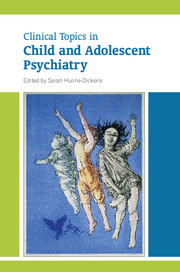Book contents
- Frontmatter
- Contents
- List of tables
- List of boxes
- List of figures
- List of contributors
- Preface
- 1 Child psychiatry and the people who have shaped it
- 2 Fabrication and induction of illness in children
- 3 Personality disorders as disorganisation of attachment and affect regulation
- 4 Post-traumatic stress disorder and attachment: possible links with borderline personality disorder
- 5 Management of antisocial behaviour in childhood
- 6 Pharmacology for attention-deficit hyperactivity disorder, Tourette syndrome and autism spectrum disorder
- 7 Pharmacology for anxiety and obsessive–compulsive disorders, affective disorders and schizophrenia
- 8 Pharmacological management of core and comorbid symptoms in autism spectrum disorder
- 9 Pharmacological treatment of depression and bipolar disorder
- 10 Cognitive–behavioural therapy with children, young people and families: from individual to systemic therapy
- 11 Anxiety disorders
- 12 Somatising: clinical presentations and aetiological factors
- 13 Somatising: management and outcomes
- 14 Evaluating psychological treatments for children with autism
- 15 Attention-deficit hyperactivity disorder: assessment and treatment
- 16 Schizophrenia
- 17 Tourette syndrome
- 18 Sleep disorders
- 19 Self-harm in adolescents
- 20 Adolescent substance misuse: an update on behaviours and treatments
- 21 Eating disorders
- 22 Gender dysphoria in young people
- 23 The psychiatry of children aged 0–4
- Index
23 - The psychiatry of children aged 0–4
Published online by Cambridge University Press: 02 January 2018
- Frontmatter
- Contents
- List of tables
- List of boxes
- List of figures
- List of contributors
- Preface
- 1 Child psychiatry and the people who have shaped it
- 2 Fabrication and induction of illness in children
- 3 Personality disorders as disorganisation of attachment and affect regulation
- 4 Post-traumatic stress disorder and attachment: possible links with borderline personality disorder
- 5 Management of antisocial behaviour in childhood
- 6 Pharmacology for attention-deficit hyperactivity disorder, Tourette syndrome and autism spectrum disorder
- 7 Pharmacology for anxiety and obsessive–compulsive disorders, affective disorders and schizophrenia
- 8 Pharmacological management of core and comorbid symptoms in autism spectrum disorder
- 9 Pharmacological treatment of depression and bipolar disorder
- 10 Cognitive–behavioural therapy with children, young people and families: from individual to systemic therapy
- 11 Anxiety disorders
- 12 Somatising: clinical presentations and aetiological factors
- 13 Somatising: management and outcomes
- 14 Evaluating psychological treatments for children with autism
- 15 Attention-deficit hyperactivity disorder: assessment and treatment
- 16 Schizophrenia
- 17 Tourette syndrome
- 18 Sleep disorders
- 19 Self-harm in adolescents
- 20 Adolescent substance misuse: an update on behaviours and treatments
- 21 Eating disorders
- 22 Gender dysphoria in young people
- 23 The psychiatry of children aged 0–4
- Index
Summary
Our understanding of the mental health of infancy and early childhood (0–4 years of age) is undergoing a transformation. Traditional psychodynamic developmental accounts are transforming into operationalised, ethological accounts of cognitive processes and adult–child interaction. Intrauterine and early-life development are being increasingly implicated in the aetiology of both child and adult mental illness, while psychological trauma and adversity in this period are being associated with physical as well as mental ill health. The concept of developmentally specific psychiatric syndromes, which underpinned diagnosis for these children, is being eroded. In treatment, there has been increasing recognition of the economic advantages of early intervention, and primary care has engaged extensively with parent training, with good effect. However, in the UK secondary care activity with 0- to 4-year-old children declined by 16.9% between 2006 and 2009, and an unpublished survey conducted by the Royal College of Psychiatrists in 2012 found that 28% of UK child psychiatrists believed that general child and adolescent mental health services (CAMHS) were not appropriate for the problems this group present. This chapter therefore presents an overview of the psychiatry of this age range, with the intention of improving awareness of the importance of mental health in children under 5, exploring the ways in which child psychiatrists may currently contribute, and indicating likely future directions for mental healthcare. A developmental psychopathology approach will be taken, to allow consideration of this group in terms of both current psychopathology and risk (and resilience) factors affecting later health difficulties.
Diagnosis and epidemiology
Diagnosis
The frequency of disorders in 0- to 4-year-olds cannot be determined without an agreed way to detect and classify them, and unfortunately diagnoses in this age range have been contentious. The traditional approach has been to emphasise differing developmental trajectories and adult– child (especially parent–child) relationships across broad behavioural domains, leading to differing forms of classification from those used in other population segments. In classic infant psychiatry, five domains were proposed as defining developmentally specific syndromes:
• pervasive developmental disorders
• reactive attachment disorders of infancy
• eating disorders of infancy
• sleep disorders
• disorders in behavioural organisation.
The first of these has now been extended into the category of autism spectrum disorders and is recognised as a lifespan diagnosis.
- Type
- Chapter
- Information
- Clinical Topics in Child and Adolescent Psychiatry , pp. 365 - 381Publisher: Royal College of PsychiatristsPrint publication year: 2014

